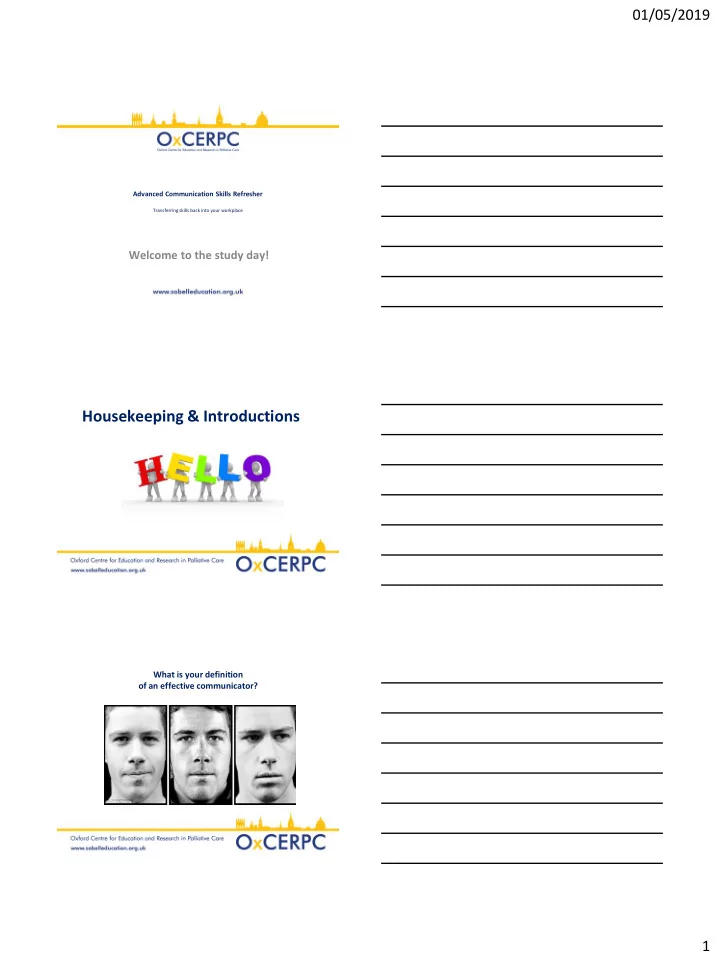

01/05/2019 Advanced Communication Skills Refresher Transferring skills back into your workplace Welcome to the study day! Housekeeping & Introductions What is your definition of an effective communicator? 1
01/05/2019 Do any of these definitions describe how you believe patients, carers and/or colleagues experience their communication with you ? Is this an Effective Communicator? Someone who………………… • Listens before responding and asks for feedback? • Recognises the difference between relational and transactional care (Sweeney 2009) • Questions widely held beliefs enshrined in communication skills training (Stokoe 2018) • Values the patients uniqueness alongside EBM and clinical expertise (Stewart et al 2007) • S tructures a consultation which “flows” and prioritises rapport (Silverman, Kurtz & Draper 2005) • Gathers what the patient has been told, has understood and how he/she feels (Gawande 2014) • Anticipates potential pitfalls (Stokoe 2014) Something More? Lim R, & Dunn S. (2018) Journeys to the Centre of Empathy: the authentic core of communication skills: OUP 2
01/05/2019 Feedback Forms Reflect 1 REVISE/REFLECT What was covered previously? • Overview of evidence • Agenda set by the participants • Presentation of communication skills in practice with trigger tapes • Practice of key skills with feedback • TRANSFERENCE REFRESH Core components of today AIM – Refresh and reflect on previous learning (ACST/ECST) and its impact when you transferred skills back into practice OBJECTIVES – Revisit & reflect on what is effective communication – Critique your communication behaviours/techniques – Practice & analyse some key communication skills – Decide what to transfer & evaluate back at base 3
01/05/2019 What’s new out there? What has ‘communicated’ to you? What are patients saying? Kieran Sweeney https://youtu-be/-uMNY55nw4 4
01/05/2019 Fast forward from NHS Cancer Plan (2000) & Darzi (2008) ……… • Communication continues to be at the heart of care Mid Staffs NHS Public Enquiry 2013; 6Cs 2012; CQC Caring services criteria ongoing; www.telegraph.co.uk/health-fitness/body 28 Jan 2018; Awdish 2018; Kissane et al 2018 • Good communication can improve physiological functioning Stewart et al 1995; Harari et al 2000 • Poor communication can lead to psychological morbidities Maguire 1996; Thylen et al 2013; Mitchell et al 2013 • Unsatisfactory communication can lead to patients and carers feeling anxious, unsafe and dissatisfied & can affect adherence to care Shilling et al 2003; www.pointofcarefoundation.org.uk ; National Patient Survey Reports 2010 onwards; Doyle et al 2014; Duty of Candour 2015; YouGov survey 2017; Achieving World Class Outcomes for Cancer 2015-20 What are your colleagues facing? Atul Gawande https://youtu.be/45b2QZxDd_o What more do we know…? • Lack of skills and job purpose affects staff leading to stress, poor job satisfaction and emotional burnout Giving Sad & Bad News Fallowfield 1993; Zohar & Marshall 2004; Gurgis et al 2006; Assisted Dying debate 2019 & ongoing • Many patients state that they do not receive the information that they need Montgomery Ruling 2015; www.each.eu • Honest and regular conversations with patients and carers are needed to achieve shared decision-making Ambitions for Palliative & EOLC 2015-20; www.respectprocess.org.uk; Royal College of Physicians 2018; Zwakman et al 2018 • A single word/para verbals can all change a conversation Parry et al 2014; Stokoe 2018; Real Talk Project – Pine & Parry 2018 • Communication skills do not improve through experience alone Thorne et al 2013 5
01/05/2019 Working Agreement Feedback Forms Revise and Refresh COFFEE BREAK 6
01/05/2019 “However brilliant we might believe we are at communication, we never see ourselves as others do and we always need to learn, both from the experience and evidence from what went before and from what the next generation have learnt from us, improved upon, and developed.” Baroness Ilora Finlay, 2018 REFLECT Revisiting the transfer session Aim • Reflect on skills, behaviours & strategies practised to improve the likelihood of their transfer and sustainability back in your workplace In order to do this you were asked to: • Set yourself a goal – identify a key skill/behaviour/strategy to transfer • Anticipate the consequences of transfer – both benefits and potential negatives • Identify support mechanisms you could draw on to ‘stay on course’ 7
01/05/2019 Headline feedback Since my last communication skills training… • Name that skill! • What effect has this had on my communications with patients/ relatives/ colleagues? On me? • What challenges did I face? How did I overcome these? Throw away a worry Feedback Forms Reflect 2 8
01/05/2019 This afternoon • Interactive • Everybody participates but nobody’s on their own • Fun • Relevant Say ‘Good Luck’ to Sakina! Restart at 13.45 please Forum theatre A live scenario in real time 9
01/05/2019 Listening L – Listening (actively) I – Interrogating S – Sermonising T – Taking turns E – Egocentric listening N – Not listening Empathy ‘People don’t care how much you know until they know how much you care’ US President Theodore Roosevelt What does it mean for me? Discussion 10
01/05/2019 Back in 15 minutes please Game time My Secret Profession Questions • Open • Closed • Leading • Multiple • QAQA 11
01/05/2019 Game time My Secret Profession (part 2) What does it mean for me? Discussion Feedback Forms Experiential learning 12
01/05/2019 Unfinished Business? Next Steps? Your feedback will be key to this REFLECT Confidence versus Competence Witmer D. (2017) 13
01/05/2019 The Four Stages of Competence “The Conscious Competence Learning Model” Noel Burch 1970s – “4 stages for learning any new skill” Dunning D. & Kruger J. (1999) “When individuals are inept (they can’t see their own faults) or highly skilled (they underestimate their abilities) they are often caught in a bubble of inaccurate self- perception.” Or alternatively............! 14
01/05/2019 The PDSA Cycle Act Plan Plan the next The change to change/cycle or be tested or progress to full implemented implementation Study Do Collect agreed feedback or Carry out the test or measurable outcomes change before & after the change. Reflect on impact & learning. Feedback Forms Next Steps 15
01/05/2019 Evaluation of the Day THANK YOU!! 16
Recommend
More recommend